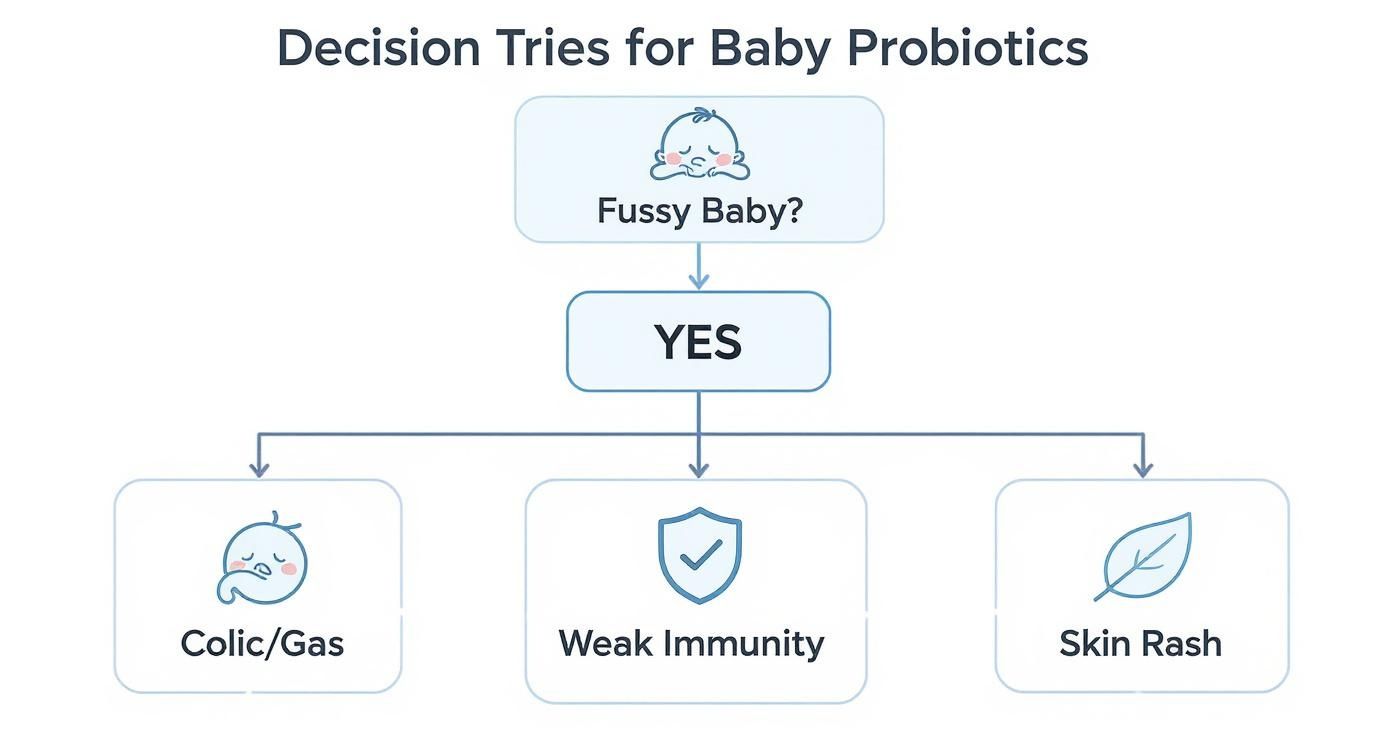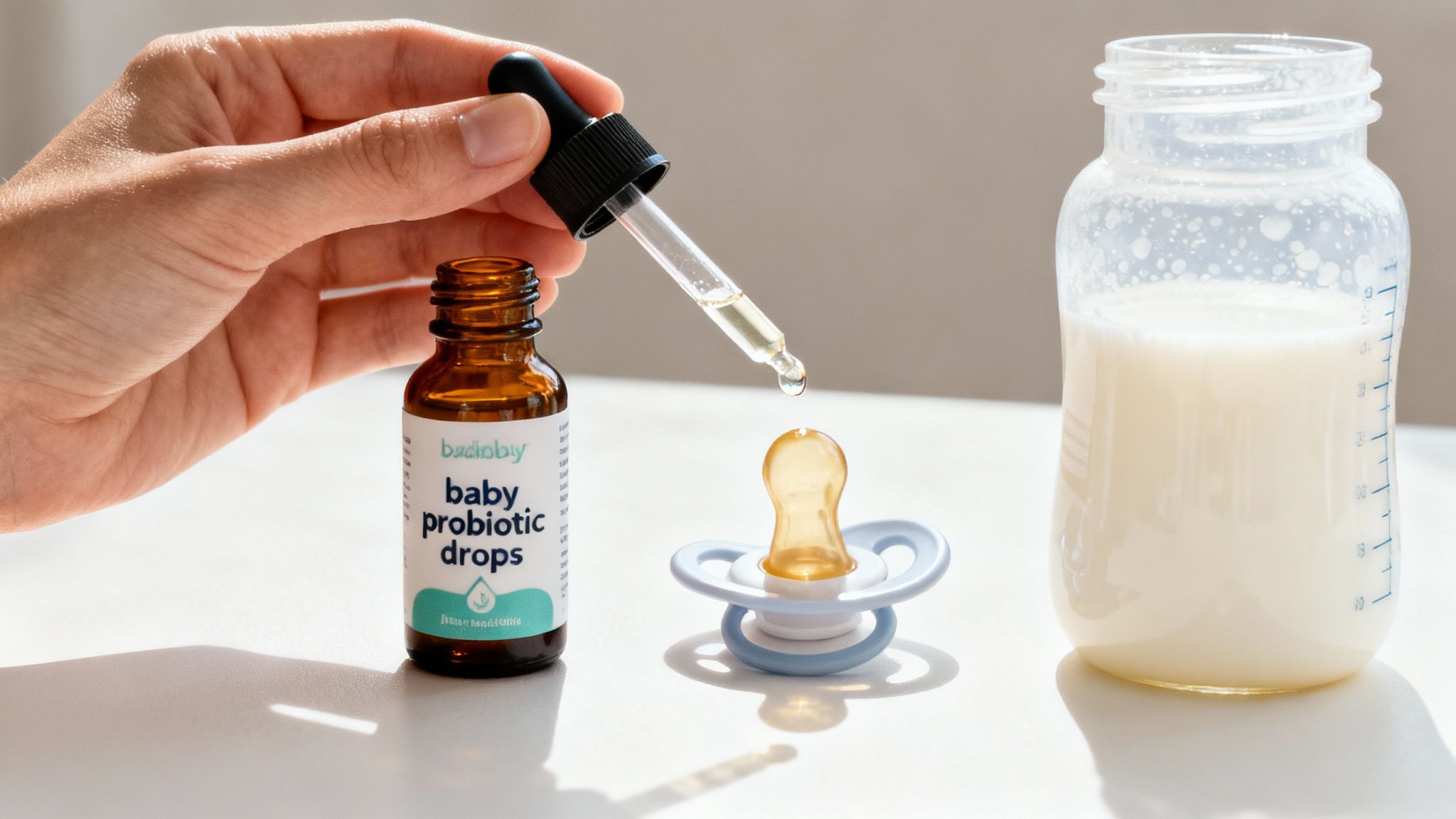A Parent's Guide to Baby Probiotic Drops
Is there anything more frustrating than seeing your baby fussy and uncomfortable, and cycling through every possible cause from gas to colic? It's so tough. We've all been there. The good news is that baby probiotic drops offer a gentle, effective way to support their digestive comfort and build a strong immune system right from the start.
This guide is your friendly, clear roadmap to understanding one of the most supportive tools in your parenting toolkit. We'll explore your baby’s gut as a tiny, developing ecosystem and walk you through how these powerful drops can bring balance and comfort.

Why This Matters More Than Ever
If you're looking into probiotics, you’re not alone. More parents are turning to them than ever before. In fact, the global market for baby probiotic drops has swelled to USD 195.6 million in 2024, which just goes to show a growing awareness of how foundational gut health really is for our little ones.
When your baby is fussy, it's often a sign of tummy discomfort. Gaining a better understanding of common issues like acid reflux in babies can be the first step toward finding relief. This is where probiotics come in, helping to soothe their system from the inside out.
Your Roadmap To A Happier Tummy
Consider this your go-to resource for understanding exactly what these drops are, why they matter, and how to choose the right one for your family. My goal is to help you feel confident and empowered in your decision.
Here's a quick look at what we'll cover to give you a clear path forward.
Quick Guide to Baby Probiotic Drops
This table breaks down the essentials, giving you a quick-glance summary of the key benefits and considerations.
| Key Area | What You Need to Know |
|---|---|
| What They Are | Liquid supplements containing live, beneficial bacteria (probiotics) to support a baby's developing digestive system. |
| Core Benefits | Can help ease common issues like colic, gas, and constipation. They also play a role in building a strong immune system. |
| Key Strains | Look for well-researched strains like L. rhamnosus GG and B. lactis, which are known for their safety and effectiveness in infants. |
| Administration | The drops are easy to give-directly into the baby's mouth, on a pacifier, or mixed into breast milk or formula. |
| Safety | Always consult your pediatrician first, especially if your baby is premature or has a compromised immune system. |
With this foundation, you'll be better equipped to navigate the world of baby probiotics and make an informed choice for your little one.
Here’s a deeper look at what this guide will cover:
- The "What" and "Why": Simple explanations of what probiotics are and how they help your baby's developing gut.
- The Real-World Benefits: How this translates to less crying, fewer tummy troubles, and a stronger immune system.
- Choosing with Confidence: What to look for on the label, from specific strains to clean ingredients.
While focusing on your baby’s gut health is a fantastic step, it's also wise to consider their overall nutritional needs. For a broader perspective, you might find our guide on the best vitamins for kids helpful for supporting their growth at every stage.
What Are Probiotics for Your Baby?
It's easy to get lost in the science, but the idea behind probiotics is actually quite simple-and incredibly powerful for your little one.
Imagine your baby’s new digestive system as a garden that’s just been prepared. Probiotics are the 'good seeds'-tiny, living microorganisms that help this garden flourish right from the start. They are essentially beneficial bacteria that work to create a healthy, balanced environment in your baby's gut.

These microscopic helpers are especially important during the first few months. Their main job is to keep the 'weeds'-or harmful bacteria-from taking over and causing issues like gas, fussiness, and general discomfort.
The Building Blocks of a Healthy Gut
A baby’s gut microbiome, which is the entire community of microbes in their digestive system, is a work in progress. It’s shaped by everything from how they were born to what they eat. That’s where baby probiotic drops come in; they're designed to gently support this brand-new ecosystem.
So, what exactly do these good bacteria do for your baby?
- They Help with Digestion: Probiotics assist in breaking down breast milk or formula, making it much easier for tiny tummies to absorb all the crucial nutrients needed for growth.
- They Create Essential Vitamins: These good bacteria act like tiny vitamin factories, producing things like certain B vitamins and vitamin K that are vital for development.
- They Train the Immune System: A balanced gut is like mission control for the immune system. Probiotics help teach it to tell the difference between friendly helpers and harmful invaders, setting the stage for long-term health.
In short, giving your baby probiotics helps build a strong foundation for their digestive and immune health that will benefit them for years to come.
Meet the Good Bacteria Families
When you start looking at baby probiotic drops, you'll see a lot of scientific-sounding names. Don't let them intimidate you! The two most common and well-researched "families" of probiotics for infants are Lactobacillus and Bifidobacterium.
Think of it this way: If probiotics are the 'good seeds' for the garden, then Lactobacillus and Bifidobacterium are like different kinds of beneficial plants. One might be great at keeping pests away (fighting off bad bacteria), while another is excellent at enriching the soil (improving nutrient absorption).
Bifidobacterium, for instance, is a true star in the guts of breastfed babies. Specific strains like Bifidobacterium infantis are masters at digesting the unique sugars in breast milk, which helps create a calm and healthy gut environment.
Lactobacillus strains, such as Lactobacillus reuteri, have been studied for their ability to soothe the digestive tract. Some research even suggests they can help reduce crying time in colicky infants. These aren't just random bacteria; they are specific types chosen for their proven safety and benefits. To learn more about how these incredible organisms function, you can dive deeper into the world of natural probiotics and prebiotics and see how they support gut health at every age.
Once you understand these basics, the labels on those little bottles become much less daunting. You're not just giving your baby a supplement; you're actively tending to their internal garden, helping it grow strong and resilient from day one.
How Probiotic Drops Can Help Your Baby Thrive
Alright, let's get to the part that really matters: how can these tiny drops make a real, noticeable difference in your baby’s day-to-day life? It’s one thing to talk about gut science, but it’s another to see your baby go from fussy and uncomfortable to calm and content.
For so many of us, those early months are a blur of trying to figure out what each cry means. Is it hunger? Sleepiness? Or that all-too-common culprit: tummy troubles. This is where baby probiotic drops can be a total game-changer, turning abstract health ideas into tangible relief for your little one.
Soothing Colic and Reducing Crying Time
If you’ve ever paced the floors at 2 a.m. with a colicky baby, you know how helpless it can feel. Colic is often tied to digestive upset and an out-of-balance gut. The good news is that specific probiotic strains have been shown to bring some peace to these stormy situations.
What this means for your baby: A calmer gut often leads to a calmer baby. Studies have shown that certain probiotics, especially strains like Lactobacillus reuteri, can significantly reduce daily crying time in breastfed infants with colic. Imagine fewer frantic evenings and more peaceful cuddles-that's the power of a happy microbiome.
This isn’t an overnight miracle, but with consistent daily use, many parents report a gradual but meaningful improvement. You're helping create an internal environment that’s less reactive and more resilient, which translates to more comfort for your baby and more peace of mind for you.
Easing Gas and Constipation
Ugh, the gas face. That little grimace and leg-scrunching that tells you your baby is struggling with a bubble they just can’t seem to pass. Or, on the flip side, days go by without a dirty diaper, leaving you worried and your baby clearly uncomfortable.
Probiotics step in to help by:
- Improving Digestion: They assist in breaking down the complex sugars in breast milk and formula, which can cut down on the fermentation that causes all that extra gas.
- Regulating Bowel Movements: By bringing balance to the gut flora, probiotics can help establish a more regular and comfortable pooping schedule, making stools softer and easier to pass.
This means less straining, less grunting, and a happier baby who isn't constantly battling their own tummy.
Building a Stronger Immune System
Did you know that a whopping 70-80% of the immune system is located in the gut? This is why a healthy microbiome is so critical right from the start. Think of your baby’s gut as a training ground for their immune cells. Probiotics act like friendly coaches, teaching the immune system how to tell the difference between a real threat (like a nasty germ) and a harmless substance.
This early training helps build a smarter, more balanced immune response, making your little one better equipped to handle those inevitable sniffles and daycare bugs. If you're looking for even more ways to support your family's health, our guide on natural ways to boost immunity has some great tips.
Potentially Lowering Allergy and Eczema Risk
Some of the most exciting research in this area is looking at the link between early gut health and the risk of developing conditions like eczema and food allergies. While the science is still evolving, the idea is compelling.
An imbalanced gut in infancy might lead to a more "leaky" gut lining, allowing undigested food particles to enter the bloodstream. This can trigger an overactive immune response, which might show up as red, itchy skin (eczema) or food sensitivities. By helping to strengthen the gut barrier and promote a balanced immune response, baby probiotic drops may play a role in lowering the risk of these conditions down the road.
It's this focus on long-term wellness that helps explain why the early life probiotics market has grown so much, reaching a valuation of USD 5.6 billion in 2024. Parents are realizing that nurturing the gut in infancy is a foundational step for lifelong health. Discover more insights about the growing early life probiotics market on emergenresearch.com.
How to Choose the Best Probiotic Drops
https://www.youtube.com/embed/Xv-WVaazaEQ
Walking down the baby aisle can feel like a pop quiz you didn't study for. With so many bottles and claims, how do you pick the right one? Let’s cut through the noise. Choosing the best probiotic drops isn’t about flashy packaging-it’s about knowing exactly what to look for on the label.
Think of it this way: you wouldn't pick just any seeds for your garden. You'd want the ones proven to thrive. The same goes for probiotics. The goal is to find a formula that is effective, pure, and designed specifically for your baby's delicate system.
Here's a simple checklist to help you choose with total confidence.
Look for Clinically-Studied Strains
This is the most important factor, bar none. Not all probiotics are created equal, and different strains do different jobs. For babies, you want to see strains that have actually been researched for safety and effectiveness in infants.
Look for specific names on the label, not just a generic family name. Strains like Lactobacillus rhamnosus GG and Bifidobacterium lactis are backed by solid clinical studies for infant gut health. Seeing these on the ingredient list is a great sign that the company has done its homework.
Understand CFUs for Tiny Tummies
Next, you'll see a number followed by "CFU," which stands for Colony Forming Units. This is simply a measure of how many live, active bacteria are in each dose. It might be tempting to think "more is better," but that's not always the case, especially for babies.
For an infant, a dose between 1 to 5 billion CFUs is generally considered the sweet spot. It’s potent enough to be effective without overwhelming their developing digestive system. It's all about finding that gentle, effective balance.
Prioritize a Clean and Simple Formula
A baby’s system is pure and sensitive, so their supplements should be, too. Honestly, the shorter the ingredient list, the better. You're looking for a product that is as clean as possible, which means no unnecessary junk.
A truly clean formula should be free from:
- Sugar and Artificial Sweeteners: Babies don’t need any added sugars in their diet, especially not in a health supplement.
- Common Allergens: Look for products that are explicitly free from dairy, soy, gluten, and nuts to avoid triggering sensitivities.
- Artificial Colors, Flavors, or Preservatives: These additives have no place in a supplement designed to support your baby’s health.
When in doubt, resources like A Parent's Guide to Chemical-Free Baby Products can be a huge help in making sure everything you give your baby is safe and gentle.
This decision tree below shows how to connect common baby discomforts with the potential support of probiotics, guiding you toward a solution.

The visual path makes it clear: whether you're dealing with colic, frequent sickness, or skin issues, supporting gut health is a foundational first step.
Probiotic Drops Checklist: What to Look For
To make things even easier, here's a quick comparison table to help you evaluate your options at a glance.
| Feature | Why It Matters | The Yuve Standard |
|---|---|---|
| Clinically-Studied Strains | Ensures the specific bacteria are proven safe and effective for infants. Generic strains lack this scientific backing. | We use only well-researched strains like Lactobacillus rhamnosus GG and Bifidobacterium lactis. |
| Appropriate CFU Count | A dosage of 1-5 billion CFUs is potent enough for benefits without overwhelming a baby’s delicate system. | Our formula provides an optimal, gentle, and effective dose perfect for infants and toddlers. |
| Clean, Allergen-Free Formula | Avoids unnecessary sugars, fillers, and common allergens (dairy, soy, gluten) that can cause sensitivities. | 100% free from sugar, GMOs, gluten, gelatin, and the top 9 common allergens. Pure and simple. |
| Vegan & Cruelty-Free | Guarantees no animal-derived ingredients or testing, aligning with ethical and plant-based values. | Certified vegan and cruelty-free. We believe in compassionate care for all, big and small. |
Using this checklist will give you the confidence that you're making an informed, safe choice for your little one.
The Clear Choice for Conscious Parents
Finding a product that checks all these boxes can feel like a unicorn hunt. That’s why we were so committed to creating a solution that meets the highest standards for our own families-and for yours.
Yuve Vegan Baby Probiotic Drops were designed to be the answer for parents seeking an exceptionally pure, effective, and gentle formula. We took all the guesswork out of it for you.
Our formula is built on clinically-backed strains specifically chosen for their proven benefits in infants. It contains a balanced CFU count perfect for tiny tummies and is completely free of sugar, allergens, and artificial junk. It’s simply the good stuff your baby needs, without any of the fillers they don’t.
Making Probiotic Drops a Simple Part of Your Day
Adding anything new to your baby’s routine can feel daunting. I get it-as a parent, you just want to get it right. So, let's break down how to use baby probiotic drops in a way that’s easy, safe, and stress-free.

Think of this as a simple guide to help you feel confident from the very first drop.
Getting the Dosage Just Right
First up is dosage. This is the one rule you don't want to bend: always follow the product's instructions or your pediatrician's specific advice. With probiotics, more isn't necessarily better. It's the consistent, daily support that makes the difference.
Most products come with a handy dropper, usually recommending a few drops once a day. It might seem like a tiny amount, but it’s a powerhouse, delivering billions of beneficial bacteria to support your little one’s gut.
Easy, No-Fuss Ways to Give the Drops
The great thing about liquid drops is how flexible they are. You have a few options, so you can easily figure out what your baby prefers.
Here are a few tried-and-true methods from parents who've been there:
- Directly in the mouth: This is often the quickest way. Gently tuck the dropper inside your baby’s cheek (not straight down their throat) and squeeze. This little trick helps prevent them from immediately spitting it out.
- On a pacifier or spoon: A clean pacifier or a small, soft-tipped spoon works great. Just put the drops on it and let your baby suck them off naturally.
- Mixed into a bottle: You can easily add the drops to a bottle of breast milk or formula. The key here is to make sure the liquid is lukewarm or cool. Hot temperatures can kill the live, active bacteria, making the probiotic ineffective.
There’s a clear reason why the market for infant probiotic supplements is growing so quickly. Parents are looking for what works, and liquid supplements were the dominant market segment in 2024, accounting for a massive 41.2% share. Simplicity wins. Read the full research about infant probiotic supplement trends.
Common Questions (and Reassuring Answers)
It’s natural to have a few questions when you start something new. Here are a couple of the most common ones I hear.
What if I miss a dose?
Don’t worry! It happens to everyone. Just resume the normal schedule the next day. There's no need to double the dose. The goal is long-term consistency, and a single missed day won’t erase the benefits.
What are normal reactions?
Sometimes, when you first introduce probiotics, you might notice small changes, like a bit more gas or a different stool consistency. This is typically just a sign that the new, good bacteria are settling in and rebalancing the gut microbiome. These effects are usually mild and temporary. But as always, if you have any concerns at all, trust your gut and give your pediatrician a call.
By keeping these simple tips in mind, giving your baby probiotic drops can become a seamless part of your daily rhythm-a small, caring act that offers powerful support for their developing digestive and immune health.
Your Baby Probiotic Questions Answered
We get it. You have questions, and that’s a great thing. Being a thoughtful, informed parent is the best gift you can give your little one. Think of this section as a chat with a trusted friend who has already done all the research for you.
We’ve gathered the most common questions we hear about baby probiotic drops and laid out the answers, clear and simple. Our goal is to help you feel completely confident as you start supporting your baby’s gut health.
Let's dive in.
When Can I Start Giving My Baby Probiotic Drops?
This is one of the first questions on every parent's mind. The short answer is that most healthy, full-term babies can start taking probiotics right from birth. Their tiny gut microbiome is just getting started, so giving it a helping hand early on can be incredibly beneficial.
However-and this is important-we always recommend having a quick chat with your pediatrician first. This is especially true for premature infants or any babies with underlying health conditions. Your doctor knows your baby’s unique history and can give you the green light, ensuring it’s the right move for your family.
Are There Any Side Effects of Baby Probiotics?
It’s completely normal to worry about side effects when introducing anything new. The good news is that for healthy babies, side effects from high-quality probiotics are very uncommon and typically super mild.
Occasionally, you might notice a temporary change, such as:
- A little extra gas
- A slight shift in stool consistency or frequency
Honestly, this is usually just a sign that the good bacteria are getting to work and rebalancing things in your baby's tummy. Think of it as a bit of 'housekeeping' in there! These adjustments typically sort themselves out within a few days. Of course, if you ever have concerns that last longer, trust your gut and check in with your doctor.
Our Pro Tip: Choosing a clean, high-quality formula made specifically for infants helps minimize the risk of unwanted reactions. This is why we created Yuve Vegan Baby Probiotic Drops to be completely free of sugar, common allergens, and artificial junk-just pure, gentle support.
How Long Does It Take for Baby Probiotic Drops to Work?
Ah, the "when will I see results?" question. It's so understandable to want quick relief, especially when your baby is uncomfortable. The timeline really depends on what you're hoping to address.
For more immediate digestive issues like gas or fussiness, some parents see a noticeable improvement within just a few days to a week of consistent use. For other, more long-term benefits-like supporting the immune system or potentially reducing eczema risk-the effects are much more gradual.
You're not just looking for a quick fix; you're building a healthy, resilient gut that will support your baby for years to come. Consistency is the absolute key. It’s like tending to a garden every single day-the beautiful blooms don't appear overnight, but the daily care makes all the difference.
Do I Need to Refrigerate Baby Probiotic Drops?
This is a great practical question, and the answer comes down to the specific product you choose.
Many probiotic formulas contain live bacteria that are sensitive to heat and moisture, so they must be refrigerated to stay potent. If they aren't stored properly, the beneficial bacteria can die off, meaning you won't get the results you're looking for.
Other formulas, like ours at Yuve, use specific strains and production methods that make them shelf-stable. This is a huge convenience for busy parents! It means you can keep the bottle handy on the counter or toss it in the diaper bag without worrying about keeping it cold.
The bottom line? Always check the storage instructions on the label. That will tell you exactly what you need to do to keep those good bacteria alive and kicking.
Can Probiotics Help with My Baby's Diaper Rash?
This is a really insightful question that connects the dots between gut health and skin health. While probiotics aren't a direct "cure" for diaper rash, they can absolutely play a supportive role.
Here’s how it works:
- Balancing the Gut: An imbalance in gut bacteria can sometimes lead to more frequent or acidic stools, which are major irritants for a baby's delicate skin. By helping regulate digestion, probiotics can reduce one of the main culprits behind diaper rash.
- Supporting the Immune System: A healthy gut helps regulate the body's inflammatory response. Since diaper rash is a form of skin inflammation, a well-supported immune system may be better equipped to keep skin calm and resilient.
So, while you'll still need your trusty diaper cream, think of baby probiotic drops as working from the inside out to create an environment where angry, red skin is less likely to show up in the first place.
At Yuve, our mission is to provide pure, plant-based, and effective solutions you can trust for your whole family. Our Vegan Baby Probiotic Drops were created with the highest standards of safety and quality in mind, giving you a simple way to support your little one's health from day one.
Explore Yuve Vegan Baby Probiotic Drops and give your baby the gift of a happy tummy today.
